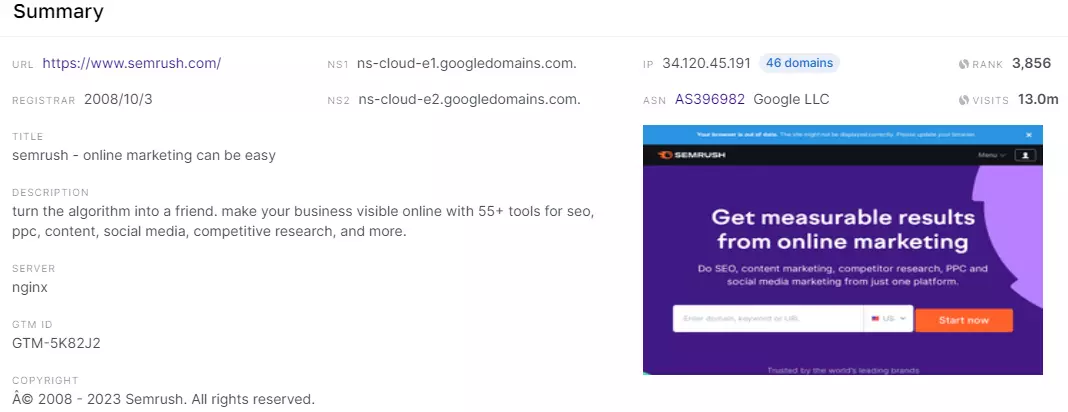
Surfer SEO and SEMrush, both renowned SEO tools boasting similar features, are widely utilized by individuals and organizations globally.
In today's discussion, we will delve into a comparison to determine which tool, Surfer SEO or SEMRush, stands out as superior for optimization.
Drawing from hands-on experience with both tools, we will guide you through their key features and provide an overview of each.
What Is SEMrush?

SEMrush is an all-encompassing SEO software utilized by individuals and businesses to enhance their online presence and glean insights into prevailing marketing trends within the digital landscape.
Founded in 2008 by a small group of SEO and IT specialists, SEMrush has undergone a transformative journey.
Today, it stands as a comprehensive platform equipped with a database housing 20 billion keywords, catering to the needs of individuals and major companies worldwide.
Checking semrush.com in Niche Finder's Website Audit, you can find this website was established in 2008, and now it has 13.0 million visits per month.

Semrush Pros
1. A vast keyword and backlink database.
2. Detailed keyword research complemented by a convenient manager for organizing terms.
3. In-depth on-page and entire website technical audits.
4. Ideal for teams and professionals seeking comprehensive, all-encompassing SEO tools.
Semrush Cons
1. Limited to providing information exclusively from the Google search engine.
2. The content editor is somewhat basic and lacks certain advanced functions.
What Is Surfer SEO?

Surfer SEO is an SEO tool offering robust strategies to enhance your website's organic traffic, elevate its online visibility, and advance its ranking on search engine results pages (SERPs).
This tool goes beyond providing pertinent keywords and ensuring that your web content not only incorporates them but is also well-optimized and structured for maximum impact.
Initially conceived as an in-house tool, Surfer SEO has now garnered widespread recognition within the global marketing community, earning the trust of renowned corporations and individuals alike.
For more detailed information, please read our guide on Surfer SEO Review.
Surfer SEO Pros
1. Extensive content editor featuring a detailed AI builder.
2. Customizable competitor pages for analysis when formulating keyword suggestions.
3. Seamless integration with Google Docs and WordPress, facilitating easy collaboration and sharing.
4. Ideal for those aiming to craft high-quality, top-notch content.
Surfer SEO Cons
1. Keyword research lacks in-depth information.
2. Absence of a free trial option for users to test the tool.
SurferSEO vs. SEMrush: In-Depth Comparison
This comprehensive comparison dissects the features of SurferSEO and SEMrush.
Keyword Analysis
Keywords serve as a vital ingredient for effective search engine optimization, and both tools provide robust keyword analysis features.
Surfer SEO
Surfer's keyword analysis tool operates in clusters. By inputting a seed keyword, the tool reveals its approximate search volume, search intent, and related keywords organized in topical clusters. It includes their respective search volumes and keyword difficulty.
The tool introduces a SERP Similarity Score, indicating the percentage of similarity each keyword shares with the seed keyword. The "Questions" segment displays queries related to the keywords, while the "Having Same Terms" segment showcases keywords containing the primary keyword or its components in any order.
SEMrush
SEMrush primarily functions as a Keyword Research tool, providing valuable information such as keyword difficulty, related keywords, and search volume.
The tool offers insights into global search volume, search volume by country, keyword CPC, variations, PAA questions, related keywords, keyword intent, trends, and more. Users can leverage this information to identify relevant keywords and enhance online visibility.
Backlink Analysis
A solid link strategy contributes to higher search engine rankings, and both tools offer distinct backlink analysis features.
Surfer SEO
Surfer SEO does not have a native backlink analysis feature. Instead, it integrates with SEMrush to unveil competitor link-building activities, presenting the acquired links in an accessible list.
While this integration is valuable, it lacks the robustness of a dedicated backlink analysis tool.
SEMrush
SEMrush provides a powerful link-building toolset, enabling users to uncover competitor backlinks and audit their backlink profile.
The tool includes a link-building tool with prospect domains, predefined outreach strategies, and outreach tracking parameters. Additionally, the backlink audit tool identifies toxic links, allowing users to disavow them to prevent potential Google penalties.
SERP Analysis
SERP Analysis involves comparing websites with competitors to identify potential improvements, and both tools offer this feature from different perspectives.
Surfer SEO
Surfer SEO presents an actionable SERP Analyzer, displaying competitor data through structured ranking factors like content structure, website quality, and media usage.
The tool provides insights into optimal keyword density, article length, and keywords to include, aiding in the creation of rankable content.
SEMrush
SEMrush approaches SERP Analysis differently. Users can analyze specific keywords using the Keyword Overview tool, showcasing keyword difficulty, search intent, and other data.
The tool displays organic search results with page authority scores, referring domains, backlinks, estimated search traffic, and the total number of keywords for a specific URL. SEMrush's Position Tracking tool allows users to analyze SERP visibility against competitors across various devices and for location-based queries.
Conclusion on Surfer SEO Vs Semrush
Surfer SEO excels in optimizing blog posts for higher search engine rankings, while SEMrush offers a broader spectrum of features beyond SEO, including social media marketing and PPC.
Choosing between the two depends on your specific needs and objectives. If your primary goal is to enhance content for improved search engine rankings, Surfer SEO proves to be the better fit.
On the other hand, if you seek a comprehensive SEO approach that encompasses data and insights about specific markets, along with other facets of digital marketing beyond SEO, such as paid advertisements, SEMrush emerges as the more suitable choice.

